Dr. Leander Starr Jameson was Rhodes' right-hand man. He was forced to resign as prime minister after leading the ill-fated Jameson Raid which was an effort by Rhodes to essentially annex the gold-rich Boer states of Transvaal and Orange Free State. Dr. Jameson was also implicated in "conquer by epidemic" schemes against the Africans when he denied outbreaks of disease in the forced labor camps of the diamond mines.
Rhodes' Cape Town estate Groote Schuur makes up much of modern-day Cape Town suburbs, and the campus is situated on land donated by Rhodes for that purpose. Rhode's house was the site of the 1990 agreement between Mandela and De Klerk which removed barriers to negotiation, pardoned political prisoners and exiles, and generally paved the way for the negotiations which ended aparteid. So the legacy of the estate encompasses both the dark and the light sides of South African history.
What fascinates me is the treatment of this legacy in campus monuments.
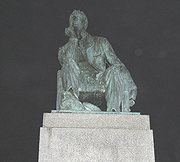 Here's Cecil Rhodes. This statue looks down from the forefront of campus, over Cape Flats, northeast into Africa and Beyond. On the granite podium is a Rudyard Kipling quote basically about the saintiness of the British Empire.
Here's Cecil Rhodes. This statue looks down from the forefront of campus, over Cape Flats, northeast into Africa and Beyond. On the granite podium is a Rudyard Kipling quote basically about the saintiness of the British Empire.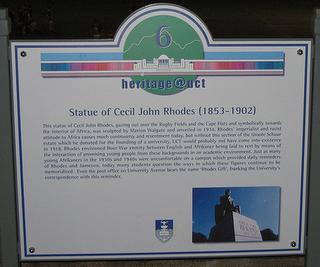
Here's the sign the university has erected near the statue. In case you can't read it, an excerpt: "Just as many young Afrikaaners were uncomfortable in the 1930s and 1940s on a campus which provided daily reminders of Rhodes and Jameson, today many students question the ways in which these figures continue to be memorialised." The discomfort of the young Afrikaaners might be attributed to the lasting tensions between English and Afrikaans-speaking South African whites after the Boer Wars. The continued questioning of the memorialisation of these figures has not, to date, resulted in any removal of any of the many Rhodes memorials.
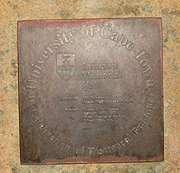 Here's the plaque on Leander Starr Jameson Hall, the architectural centerpiece of this beautiful campus. It's much more subtle than the many large bronzes of Rhodes. However, the university-posted sign sort of seems to make things worse:
Here's the plaque on Leander Starr Jameson Hall, the architectural centerpiece of this beautiful campus. It's much more subtle than the many large bronzes of Rhodes. However, the university-posted sign sort of seems to make things worse: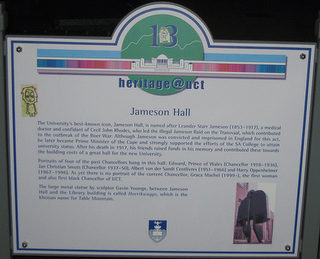 After explaining a bit about Jameson, the sign goes on to say that portraits of the four chancellors of UCT since the erection of the hall in 1918 are hanging inside. However, the first woman and first black chancellor, who has been at her post since 1999, does not have a portrait hanging inside yet. Now why would they bother to get a sign made up to tell people there is no portrait? Why not just hang a portrait? Or doesn't she get one?
After explaining a bit about Jameson, the sign goes on to say that portraits of the four chancellors of UCT since the erection of the hall in 1918 are hanging inside. However, the first woman and first black chancellor, who has been at her post since 1999, does not have a portrait hanging inside yet. Now why would they bother to get a sign made up to tell people there is no portrait? Why not just hang a portrait? Or doesn't she get one? A large symposium is going on Sept 2, the topic of which is something like Changing Afrikaaner Masculinity or What is Whiteness now? or both. White guilt takes a different form here than back home. It's less. . . common. But still present. There are strong incentives, even requirements, for racial hiring quotas. This is a bit of a problem because white males are still the best educated and highest trained workers in the country. As one of the office staff told me this morning, the children now will grow up their entire adult lives in "Transition". The benefits won't come until their children are growing up. I wonder if she's right. But it's inspiring to see that the whole of society, while grumbling, seems to feel the burden to shoulder the cost of rapid integration. Not everybody, but on the whole. Maybe I'm optimistic because I'm new. But the air feels somewhat clearer here around race issues than it feels back home.
**Edit 24/8/06: Casey's right! They don't post chancellors' photos until they've left the post. So scratch that bit. But check out this other statue of Rhodes at the memorial at the top of campus:
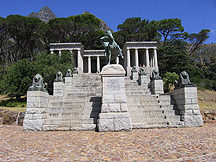


1 comment:
Buy cheap cigarettes online!
Post a Comment